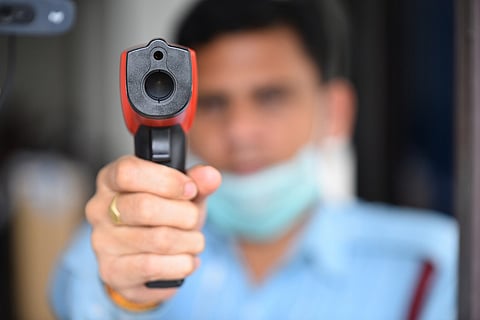

In an innovation that could be a breakthrough in the efforts to detect and contain the transmission of COVID-19, a team at the Sree Chitra Institute for Medical Sciences and Technology in Thiruvananthapuram, has developed a cheaper and faster diagnostic kit that can do the gene detection in ten minutes. Sree Chitra Institute for Medical Sciences and Technology is a central government institute that comes under the Department of Science and Technology.
While the cost of the test is Rs 1000, the total time taken to process results will be cut down to 2 hours using the reverse transcriptase loop-mediated amplification of viral nucleic acid (RT-LAMP).
The RT PCR or real-time reverse transcription polymerase chain reaction kit is the only one so far that can detect the SARS-CoV-2 virus which causes the COVID-19 disease. However, besides being expensive (Rs 4500 for a test at a private lab), the kit takes at least 24 hours to process the results.
The kit has been named Chitra GeneLAMP-N. A press release put out by Sree Chitra Institute for Medical Sciences and Technology claims that it is highly confirmatory for the diagnosis of the SARS-CoV-2 virus. The kit detects the N (Nucleoprotein) gene of the SARS-CoV-2 virus using reverse transcriptase loop-mediated amplification of viral nucleic acid (RT-LAMP).
This could be perhaps the world’s first few if not the first confirmatory diagnostic test for the N gene of SARS-CoV-2 using the RT-LAMP technique,” states the press release.
The kit can detect two regions of the gene which implies that even if one region of the viral gene undergoes mutation during its current spread, there would be accuracy in the result.
The license for the kit was sanctioned by Central Drugs Standard Control Organisation (CDSCO). A team at the institute, located in Thiruvananthapuram, that specializes in molecular biology and headed by Dr Anoop Thekkuveettil developed the kit in three weeks.
“We had been working on various programmes, and one of the programmes was diagnosis of Tuberculosis. The technology we developed for TB was almost at an advanced stage and at that phase was when the COVID-19 outbreak happened. We immediately moved on and tried (diagnosis) with the same machine we used for TB. We had the knowledge base as we worked on TB infection and we were able to do it at a fast pace. Also the facilities were available at the institute lab,” Dr Anoop told TNM.
Thirty samples can be tested in a single batch in a single machine and the significantly lower machine waiting time will allow a large number of samples to be tested each day in a single machine in multiple shifts.
The scientist has been working at the institute for the past twenty years at the Biomedical Technology wing of the Institute.
Validated by NIV Alappuzha
The Indian Council of Medical Research (ICMR) had authorized the National Institute of Virology (NIV) in Alappuzha to validate the tests. While the kit has since been validated, ICMR will now have to approve it.
“We have validated at NIV Alappuzha as suggested by the ICMR, we could see that whatever PCR (Polymerase Chain Reaction) results with samples which were giving positive we also got positive and the same for negative. Hence the NIV gave hundred per cent validation. With this we can test as many people as possible immediately and that is what is required to get out of the disease” he added.
Dr Anoop is also in -charge of the division of molecular medicine under the Department of Applied Biology.
With its cost effectiveness, the kit can be set up even in the laboratories of district hospitals. This is operational with limited facilities and trained laboratory technicians.
The technique, Dr Anoop added, doesn’t require any sophisticated equipment unlike the RT-PCR which needs a high-end machine. “In the kit the reaction happens at one particular level of temperature and what we require is a class two air circulation circuit. The expense to set up the testing facility with the kit would be Rs five lakh only which is quite affordable for the government. And we hope that test with the kit can commence in the near future at the district hospitals too.”
What makes the kit innovative is the particular gene that is targeted- the N gene, though the technology- the clap technique had been there. According to Dr Anoop only two companies worldwide have been attempting the test with the same technique.
“We are targeting the N gene, because that is the one suggested by the World Health Organisation (WHO) as more confirmatory. In India we use more genes. My concept is to use the confirmatory gene so that we don’t need to be tested again and again. With the confirmatory gene we would get the result at one go and that’s what we need at this point of time, as fast as possible screening without waiting for revalidation as these are retirements in the whole process. In the technology we are almost bypassing PCR which is the standard test at this moment,” Dr Anoop adds.
The kit is developed with indigenous machines as no countries sell them now and also because all the countries need the same equipment.
The results can be read from the machine from the change in fluorescence. The institute has also additionally developed the specific RNA extraction kits along with GeneLAMP-N test kits and the testing device.